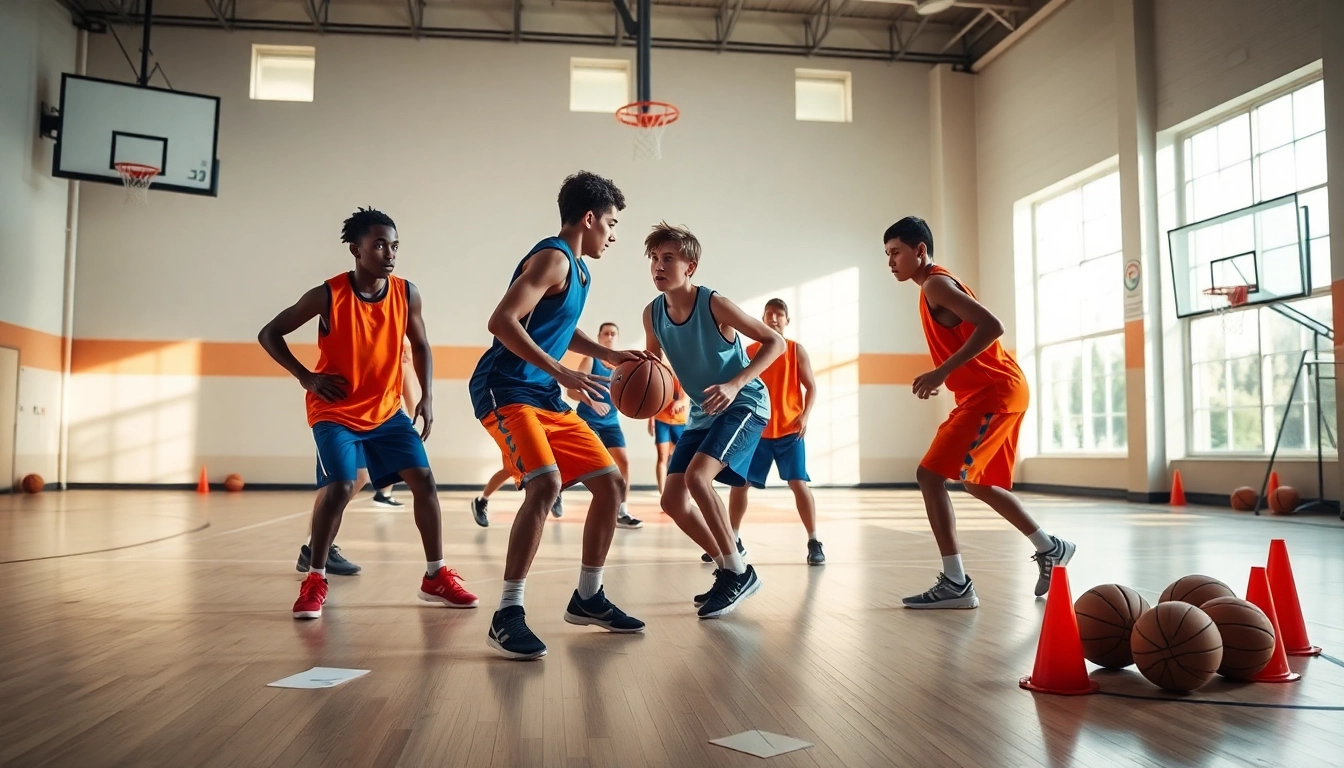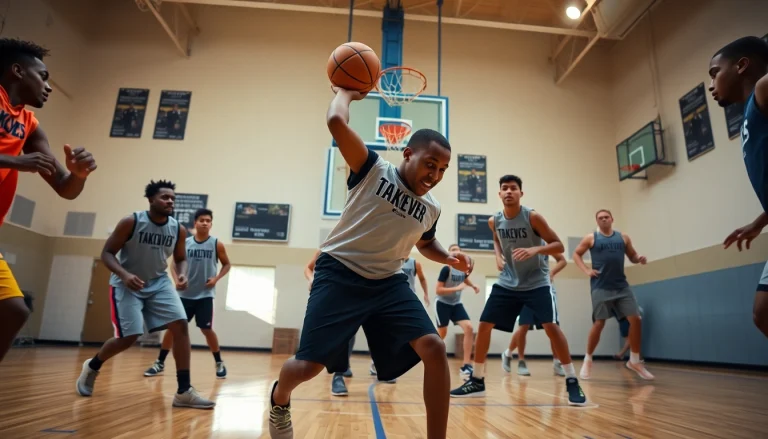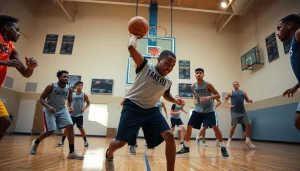Understanding the Best Basketball Training Programs
Basketball is more than just a game; it’s a pathway to personal growth and athletic excellence. As players strive to enhance their skills, the demand for best basketball training programs surges. These programs are designed to equip players with the necessary tools to refine their abilities, understand the nuances of the game, and ultimately excel in their performance on the court. However, not all training programs are created equal. Understanding what constitutes a quality basketball training program is essential for players seeking improvement.
What Constitutes a Quality Basketball Training Program?
A quality basketball training program embodies various critical elements. At its core, it should be tailored to meet the individual needs of players, factoring in their current skill level, age, and specific goals. Additionally, a good program integrates theoretical understanding with practical application, ensuring players not only practice skills but also comprehend game strategies and tactics.
Another hallmark of a quality program is the accreditation and experience of the coaching staff. Coaches should have a solid background in basketball, whether through collegiate play, coaching certifications, or experience in professional settings. This expertise translates to better mentorship and skill development for the players.
Moreover, the program should offer a blend of physical training, mental conditioning, and skill development. Conditioning sessions that focus on endurance, strength, and agility can significantly enhance a player’s on-court performance. Meanwhile, sessions that emphasize game intelligence and mental fortitude are crucial for handling high-pressure situations during games.
Key Components of Effective Training
Effective basketball training programs typically include several key components:
- Individual Skill Development: Training should focus on fundamental skills, including shooting, dribbling, and passing. Programs must provide structured drills that target specific areas for improvement.
- Game Situations and Scrimmages: Incorporating game-like scenarios allows players to practice their skills under pressure, enhancing their decision-making and adaptability.
- Physical Conditioning: Strength and conditioning programs tailored for basketball can help athletes develop the endurance and explosiveness needed for competitive play.
- Mental Training: Teaching players about sports psychology, such as visualization and focus techniques, can boost their confidence and performance levels during games.
How to Select the Right Program for Your Skill Level
Selecting the right basketball training program involves evaluating a few critical factors:
- Self-Assessment: Players should begin by assessing their skills, strengths, and weaknesses. Understanding where they currently stand can help in selecting a program that meets their needs.
- Goal Setting: Whether the goal is to make a school team, improve specific skills, or prepare for college recruitment, training programs should align with those objectives.
- Research and Reviews: Investigating various training programs, reading reviews from past participants, and even visiting training sessions can provide valuable insights.
- Trial Sessions: Many training academies offer trial sessions. Attending these classes can give players a feeling for the training environment and coaching methodology.
Types of Basketball Training Programs Available
The landscape of basketball training is diverse, catering to different preferences and needs. Understanding the options available can significantly aid players in making informed decisions about their basketball education.
Individual vs. Team Training Approaches
When it comes to basketball training, players can choose between individual sessions and team-based approaches. Individual training typically focuses on personalized skill enhancement. This approach allows for tailored instruction and concentrated development on specific areas that need improvement. Coaches can provide immediate feedback based on a player’s unique characteristics, which heightens the training experience.
On the other hand, team training fosters collaboration and understanding of team dynamics. Players learn to communicate effectively, anticipate their teammates’ actions, and work toward common objectives. Team training simulates actual game scenarios and helps players develop chemistry with their teammates, which is essential for success in any competitive setting.
Online Basketball Training Programs and Their Benefits
In today’s digital age, online basketball training programs offer a flexible and effective alternative to traditional training methods. These programs often provide various resources that players can access anytime and anywhere, making them especially convenient for those with busy schedules.
Key benefits of online training include:
- Accessibility: Players can engage with training materials, instructional videos, and virtual coaching sessions regardless of their geographical location.
- Vast Resources: Online platforms often feature a wide range of materials, from technical skill drills to nutrition guidance, enabling a holistic approach to player development.
- Cost-Effectiveness: Many online programs are more affordable than in-person training, making high-quality coaching accessible to a broader audience.
Specialized Camps and Workshops for Intensive Skill Development
Specialized camps and workshops focused on intensive skill development are crucial for players eager to elevate their game. These programs often cater to specific skills such as shooting, defense, or overall gameplay strategies. Designed for improvement within a condensed period, camps usually run for a few days or weeks and involve rigorous practice schedules.
Benefits of attending specialized camps include:
- Focused Learning: With specialized coaches, players receive targeted training that addresses their specific weaknesses and areas for improvement.
- Networking Opportunities: Camps can serve as a fantastic platform for players to meet others who share their passion, building friendships and networks within the basketball community.
- Exposure to Advanced Techniques: Players may learn advanced techniques that aren’t always available in regular team practices.
Essential Skills Developed Through Training
High-quality basketball training programs focus on developing a wide range of skills essential for success. Here, we explore the key skill sets that such programs aim to cultivate in players at all levels.
Ball Handling and Footwork Drills
Ball handling and footwork are fundamental skills that every basketball player must master. Effective ball handling allows players to maintain possession, create scoring opportunities, and navigate through defenses. Training typically focuses on various dribbling techniques, including crossovers, behind-the-back dribbles, and hesitations, enabling players to become versatile with the ball.
Footwork drills complement ball-handling training by enhancing agility and balance. Players learn essential movements such as pivoting, cutting, and changing direction quickly to evade defenders or execute plays effectively. Regular practice of these drills can dramatically improve a player’s overall game and control.
Scoring Techniques and Shooting Accuracy
Shooting is a critical aspect of basketball and mastering scoring techniques can set players apart. Effective training programs teach various shooting techniques, including the jump shot, layup, and free throw. Emphasis is placed on proper shooting form, spacing, and shot selection to ensure players can consistently score points under pressure.
Additionally, programs may include shooting drills that mimic game situations, allowing players to practice shooting off screens, catching and shooting, or taking shots after dribbling. Many training regimens also utilize technology, like shooting machines, to provide instant feedback on shooting mechanics, helping players fine-tune their accuracy.
Defensive Strategies and Game Intelligence
Defensive skills are just as vital as offensive capabilities in basketball. Effective training programs place a considerable focus on teaching defensive strategies, emphasizing positioning, footwork, and anticipation. Players learn to read their opponents’ movements, contest shots, and effectively utilize help defense.
Moreover, players are encouraged to develop their game intelligence, which encompasses understanding plays, recognizing patterns, and making smart decisions in real-time. Game film analysis is often utilized to reflect on gameplay, enabling players to learn from both their successes and mistakes while providing an opportunity to strategize for upcoming matches.
Measuring Progress in Basketball Training
Tracking progress in basketball training is crucial for players to understand their development and make necessary adjustments. Effective measures ensure that players remain motivated and focused on their personal goals.
Setting Realistic Goals for Improvement
Setting specific, measurable, attainable, relevant, and time-bound (SMART) goals can significantly enhance a player’s training outcomes. Instead of vague aspirations like “getting better,” players can set precise targets such as improving shooting accuracy by a certain percentage within a month or successfully performing a specific number of dribble moves during scrimmages.
Regularly revisiting and adjusting these goals based on a player’s performance and changing circumstances is essential for sustained motivation. Players should also celebrate milestones, as acknowledgment of progress can strengthen overall dedication to training.
Utilizing Video Analysis for Skill Evaluation
Video analysis has become an invaluable tool in sports training. By recording and reviewing practice sessions and games, players can objectively evaluate their performance. This analysis allows for a deeper understanding of strengths and weaknesses, providing a basis for improvement.
Essentially, players can examine their shooting postures, dribbling patterns, defensive positioning, and more. Utilizing video feedback, coaches can offer more detailed insights, reinforcing effective practices and correcting flaws that may hinder performance.
Keeping Track of Performance Metrics and Feedback
Maintaining a record of performance metrics, such as shooting percentages, assists, turnovers, and defensive stats, can illuminate progress over time. Coaches and players should regularly review these metrics to identify trends and modify training focuses accordingly.
Additionally, soliciting feedback from trainers and peers is vital. Constructive feedback fosters an environment of continuous improvement and encourages adaptive learning strategies tailored to meet each player’s needs.
Success Stories from the Best Basketball Training Programs
The efficacy of quality basketball training programs is often best illustrated through success stories. Real-life examples provide motivation and underscore the transformative potential of dedicated training.
Testimonials from Players Who Transformed Their Game
Many renowned athletes credit their success to the right training programs. For instance, a well-known player might share how a specific program helped them improve their shooting mechanics or develop essential defensive skills. Testimonial accounts frequently highlight how tailored training can lead to not just improved performance, but also greater confidence and enjoyment of the game.
Showcasing Growth: Before-and-After Comparisons
Visual evidence serves as powerful motivation for aspiring players. Many basketball training programs showcase before-and-after comparisons of participants, illustrating noticeable improvements in skill levels, physical fitness, and gameplay effectiveness. These transformations are often recorded in the form of videos and photos that vividly present the players’ progress over time.
This visual testimony not only bolsters the credibility of training programs but also inspires new players who may be uncertain about their potential for improvement. Such showcases serve as reminders that with commitment and the right guidance, anyone can elevate their game.
Analyses of Famous Athletes and Their Training Backgrounds
Looking at the training backgrounds of famous basketball players can provide insights into effective training methodologies. For example, stars like Kobe Bryant and Michael Jordan are known for their relentless work ethic and attention to skill refinement during their training regimens. Analyzing their approach to training can inform young athletes about the importance of discipline, practice, and continuous improvement.
Furthermore, exploring the specific programs or coaches that played a pivotal role in these athletes’ development can help aspiring players understand what to seek in their training experiences.
Conclusion
In the pursuit of basketball excellence, engaging in the best basketball training programs is vital. By understanding the components that constitute effective training, assessing the various types of programs available, and tracking individual progress, players can significantly enhance their skills and performance. Ultimately, quality training programs not only develop athletes on the court but also foster necessary life skills that extend beyond basketball—from discipline to teamwork and perseverance. For those committed to excellence, these training experiences are invaluable stepping stones on the journey to becoming a great player.








